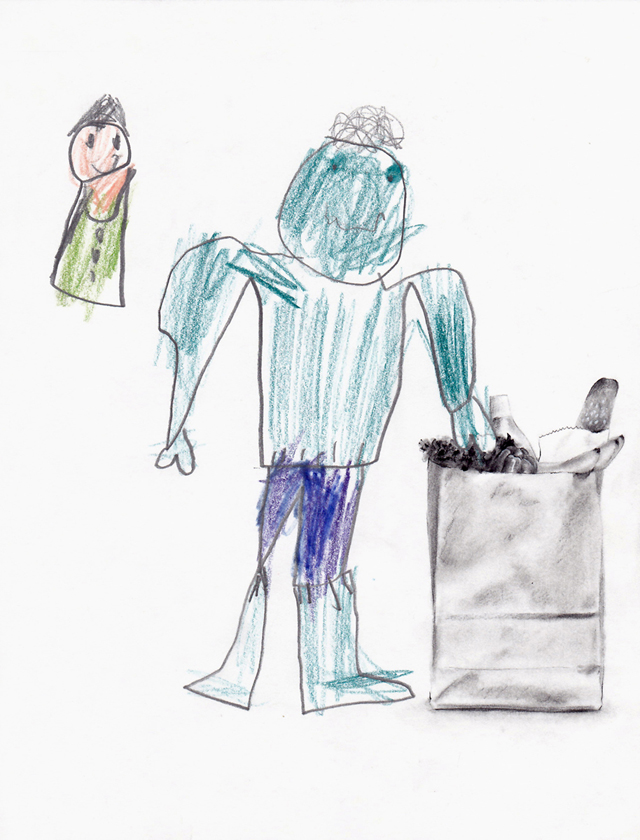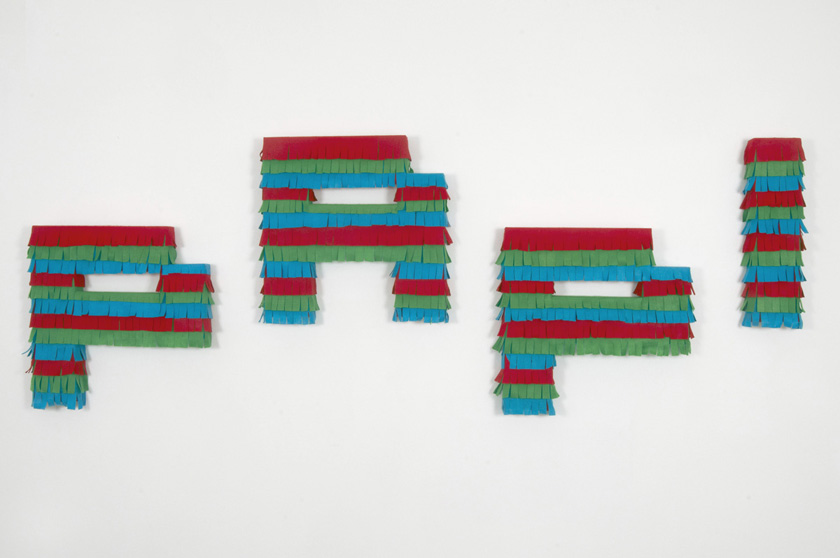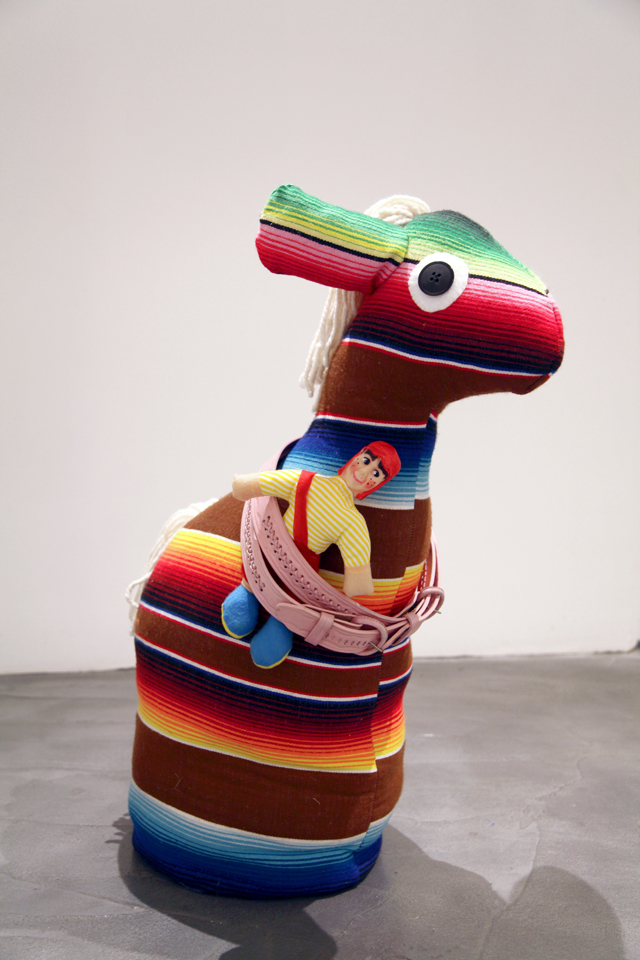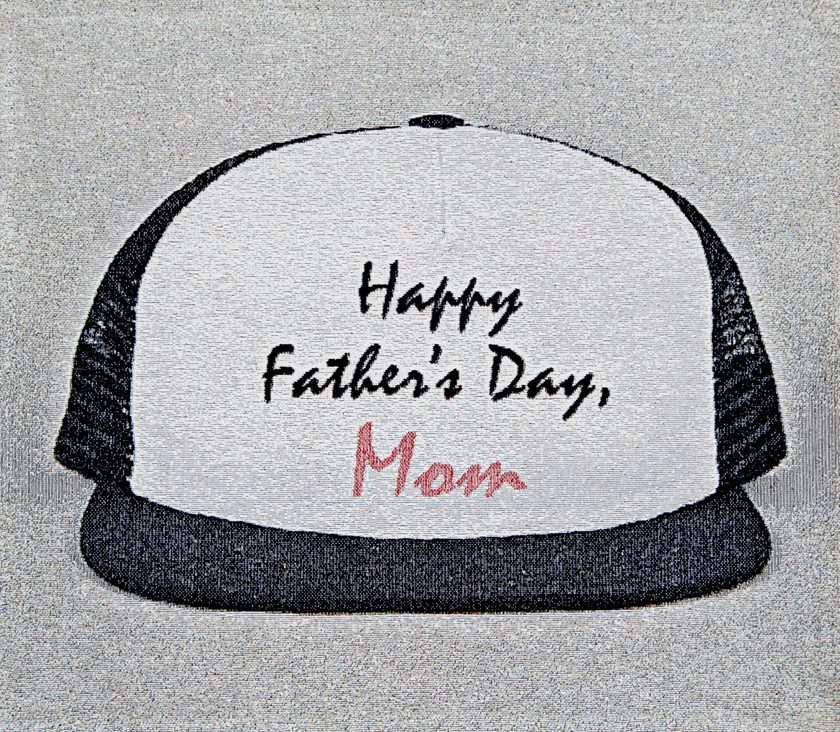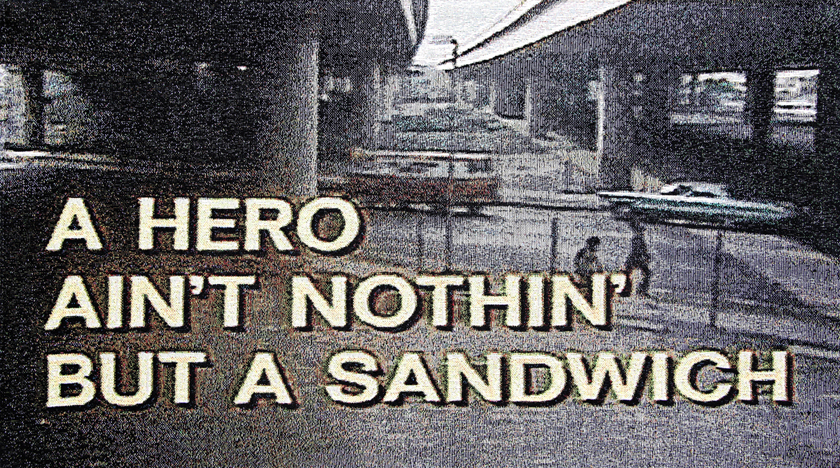
Looking for heroes, finding them close to home at the Bindery Projects
At the entry of the Bindery Projects’ new exhibition of work by Los Angeles artist Nery Gabriel Lemus, the first thing you see is a small cotton tapestry, a textile rendering of a dark photograph of an urban underpass. The tapestry image is emblazoned with the title of the show in thick, white, block letters: “A HERO AIN’T NOTHIN’ BUT A SANDWICH,” taken from Alice Childress’s 1973 book of the same name, about an African-American boy veering toward heroin addiction and hopelessness.
“A Hero Ain’t Nothing but a Sandwich,” cotton tapestry, 2013. Courtesy of the artist and Charlie James Gallery.
Lemus, in his artist statement, writes about his interest in exploring “the concept of heroism, particularly what constitutes a hero.” But really, he’s deconstructing something even bigger than that – his is work that challenges machismo-inflated notions of what it means to be a man. A social worker for 14 years, working with men and boys, the artist says he’s seen first-hand what happens when fathers absent themselves from their kids’ lives, when boys and young men have too few real-life positive masculine role models on whom to build their aspirations.
“Groceries Hulk” (Things I Learned from Dad and TV), mixed media, 2013. Courtesy of the artist and Charlie James Gallery.
Head around the corner from the entry and into the first room of the gallery, and you find a short, seven-minute film, “Proclamation of the Lined-up Fade.” It features a sequence of men in barbershops – mostly men of color who look to be in their teens and twenties – all of them getting a line-up and fade haircut. The film is quiet – disarming and mesmerizing. Watching, I’m struck by the vulnerability of the interactions on view, the countless small ways these everyday rituals of care defy the hard-edged pop cultural portrayals of young men of color. Submitting to the gentle work of fingers on scalp for the shampoo, the delicate processes of shaving and scissors — it’s all so intimate.
“PAPI,” felt on wood, 2013. Courtesy of the artist and Charlie James Gallery.
Enter the main room of the gallery, and on the wall to your left hang a series of collaborative drawings Lemus has made with his young son, Gael: “The Things I Learned from My Dad and TV.” Lemus’s little boy, now 6 years old, has drawn the same sort of thing that my son fixates on: superheroes and Power Rangers, images from “Star Wars,” “Toy Story” and the like. Lemus takes his son’s crayoned drawings and embellishes them with additional illustrations or text balloons, so that the pictures offer striking hybrid of real and imagined masculinity. The interplay of these ideals is by turns witty and insightful: an unmasked, burned Darth Vader exclaims, “I love you Luke!”; a smiling Hulk stops by, not to smash things but with a bag of groceries; Woody offers Buzz Lightyear a giant, blooming rose; Spider Man, arms held wide, asks “Can I do anything for you?”
On the adjacent wall is a wood-and-felt piece, a pinata made of letters fringed in red, green and blue reading “PAPI” – an all-purpose endearment used between fathers and sons, husbands and wives (similar to “Daddy”). Nearby is one of two hand-stitched stuffed critters on view in the room, both of them made from felt and traditionally-patterned Guatemalan textiles. Lemus says they’re large versions of the sorts of handmade stuffed toys he played with as a boy. One of them, “All Grown Up, Never Grew Up” is round and Angry Bird-like; it has eaten/embraced a small boy so that just a surprised face, straw hat and sandaled feet are visible, poking out from the animal’s sides.
“Goin Where You Goin, That’s Where,” mixed media, 2013. Courtesy of the artist and Charlie James Gallery.
Across the room sits “Goin Where You Goin, That’s Where” – another large stuffed animal, this one horse-like; a pink belt loops around its neck, strapping a stuffed human figure in a red hunting cap against its body. The artist tells me the figure is Chavo del Ocho – a poor, homeless boy, always looking for someone to watch over him and getting into various sorts of hilarious trouble – the central character in a popular Mexican children’s television show. Nearby is “Dropping in On You,” and a plush blue bunny who’s knotted up in the corded end of a hammock, which is suspended from the ceiling and hanging down to the floor. There are two more cotton tapestries on the walls: one depicts a ball cap bearing the pointed phrase, “Happy Father’s Day, Mom”; the other a young man in a hooded sweatshirt, seen from the back, overlaid with a text paragraph extolling the virtues of a “real” hero, who abstains from liquor, cares for his loved ones and respects women.
“Happy Father’s Day, Mom,” cotton tapestry, 2013. Courtesy of the artist and Charlie James Gallery.
Lemus’s work is utterly earnest and unabashedly personal. There’s nothing coy about what the artist is after here, and little about the installation that’s particularly oblique. The exhibition challenges machismo in both medium and message – with the gentle craftwork of needle and thread, with images of children rather than celebrations of physical prowess or gunplay. The work as a whole presents a defiantly domestic, homespun demeanor. And that heartfelt candor is the very strength of the show: these pieces cry out, variously but with one voice, that manhood need not be aloof from love, that real masculine potency derives not from force of will or displays of power, but rather from a man’s willingness to serve, and to care for his family and community.
“A Hero Ain’t Nothing but a Sandwich” by Nery Gabriel Lemus will be on view at the Bindery Projects July 13 through August 16, 708 Vandalia Ave., St. Paul. For gallery hours: http://thebinderyprojects.com/thebindery_projects/home.html.
Recent Content
-
Artsarticle ·
-
Artsarticle ·
-
Artsarticle ·
